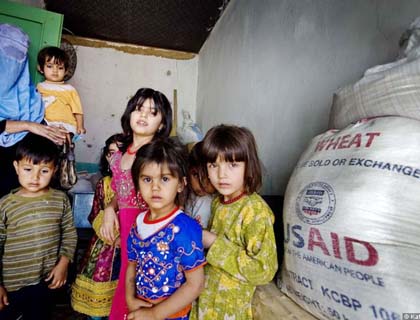In an environment of constant war and conflict, and when the news of fatalities, explosions, the dead and the wounded grab the headlines, the welfare and economic prosperity of the people of Afghanistan have been pushed to the bottom. Its seems that gone are the days when there was a remarkable enthusiasm within the government, civil society, the NGOs, aid community and the general population to rapidly and effectively provide jobs and employment opportunities and reduce poverty.
Over the years and slowly, along with the gradual worsening of security situation across the country, the initial enthusiasm and activism has given way to questions and doubts. The fervor and eagerness of the early years in the international community and the donor countries have withered away and even the leadership of the government does not seem to be as keen on achieving good results for the people as it used to be in the earlier years. The gradual fall in the enthusiasm of the international community to financially help in Afghanistan is evident in the plummeting volume of foreign aid coming into the country and the fact that the foreign donors have pledged less aid in recent years compared to the earlier years.
Such international and global problems such as the global economic crisis that brought many countries in the West to the brink of bankruptcy have also worked to decrease the level of international community's financial aid to Afghanistan. The financial assistance and foreign aid that Afghanistan receives from European countries is in danger of being significantly reduced in recent years given the fact that many of these European countries are struggling with a severe financial crisis. The crisis, which has come to be named the Euro Zone crisis, has already engulfed Greece and Ireland and in all likelihood is expected to spread to Italy and possibly a number of other European countries, many of which are at the forefront of providing financial assistance to Afghanistan.
As a result of the ongoing crisis, the countries affected have had to reduce their spending and reduce government budgets to affordable levels. In such situations, monetary commitments of these governments like foreign aid come to be among the first victims. This is a serious reality and for Afghanistan, it means less financial assistance from these European countries. The government of Canada announced in October 2010 that it will reduce the amount of its financial assistance to Afghanistan and will only work on two projects – one rebuilding the Dahla Dam in Kandahar province and the other being building and equipping of 50 schools throughout the country - in addition to its technical support to training Afghanistan's national security forces.
However, as it is the case with any other country, what is primarily important is the wise and effective utilization of the foreign financial assistance and taking the maximum benefit out of these limited resources that are made available. As the international financial assistance decreases, which has so far been a very important source of developmental fund for Afghanistan, it becomes highly important to drastically increase government's capacity to effectively use the available funds.
Up until now, there have been significant impediments in the way of reaping maximum benefits out of foreign financial assistance. Many factors have limited the extent of the benefits reaching to common people and as a result real and tangible impact on the lives of people has been limited. The bulk of foreign assistance has so far been channeled through NGOs and UN agencies with the government of Afghanistan having little say in how and where the funds are spent. Lack of coordination among the NGOs and UN agencies and the government have resulted in spending of funds on projects that actually have little impact on the lives of the people or projects whose costs far surpass the benefits.
To a large extent, the true priorities of the society and economy of Afghanistan were neglected by the NGOs and other non-governmental organizations involved in spending foreign assistance. The government has not been placed in the larger picture and its corruption and ineptitude prevented it from taking active part in rebuilding the country. The gradual deterioration in security situation across the country meant that less reconstruction and developmental projects could be implemented in unsafe areas. In volatile provinces in the south and east, a large majority of aid organizations have suspended activities and projects.
The Kabul International Conference held exactly a year ago in July 2010 announced what was a very important step in the right direction. It announced for the first time that at least half of foreign financial assistance will be channeled through the government of Afghanistan. While this remains to be only a pledge, it is in itself a major re-thinking of how and where the foreign assistance should be spent. What is clear is that the foreign funds need to be spent according to national and local priorities and to achieve this objective the hand of the government must be strengthened. There are huge obstacles in the way of realizing this objective such as pervasive corruption in the government and low institutional capacities for planning and operations.
However, only complaining about the low level of government's capability and corruption does nothing to get us out of the problem or to address its causes. However bad and inefficient the government may be, there can be no escaping the necessity of improving its capacities and reducing the severity of the corruption raging within it. Therefore, pressing ahead with current reform programs and capacity building in various government agencies in the center and provinces over the long term is crucially important. The emphasis should be on increasing government's participation and ownership in all programs that are implemented in Afghanistan with the aim of improving the state of the people. This is primarily because in under-developed countries such as Afghanistan, it is only the government that can function as a powerful engine of economic, political and social progress.

